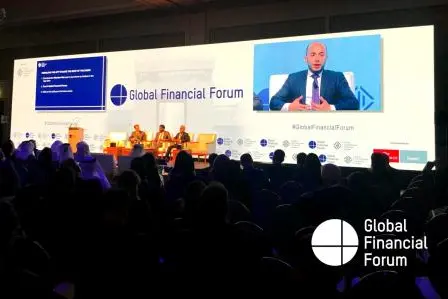PHOTO
Dubai, UAE: On November 14th, the inaugural Global Financial Forum, organised by the Dubai International Financial Centre (DIFC), the leading international financial hub for the Middle East, Africa and South Asia (MEASA), was held under the patronage of His Highness Sheikh Maktoum Bin Mohammed bin Rashed Al Maktoum , Deputy Ruler of Dubai and President of DIFC. The conference was programmed by magazine The Economist.
The event provided a platform for expert-led sessions on geo-economic trends shaping the region as well as technological developments that are geared to take the financial services industry to the next level.
During his opening speech, H.E. Essa Kazim, Governor of the DIFC, announced the launch of a USD 100 million FinTech-focused fund to accelerate the development of financial technology.
Delegates had the opportunity to listen to world class speakers, among them Bill Winters, CEO of Standard Chartered Bank; Arif Naqvi, CEO of Abraaj Capital; Karim El Solh, CEO of Gulf Capital; Abdullah Mohammed Al Awar, CEO of the Dubai Islamic Economy Development Centre; Hafez Ghanem, Vice-President of the World Bank for the Middle East and North Africa; Dr Patrick Njoroge, Governor of the Central Bank of Kenya; Mohamed Damak, Global Head of Islamic Finance of S&P Global Ratings; Soumya Kanti Ghosh, Chief Economic Advisor of the State Bank of India; Kevin Sneader, Chairman of McKinsey for Asia
In his speech during the panel session Emerging markets: leaders and laggards, Houssam Nasrawin, CEO of GDC Partners and President of Arab Business Leaders said that it was still too early to know which countries are the leaders and the laggards in the MENA region. Countries performances must be evaluated in the medium or long term. The region faced several challenges and changes in the past 7 years: Arab spring, wars, turmoil, economic crisis, low oil price Some countries in the region have announced new reforms to diversify their economies and to achieve sustainable growth and develop new knowledge and technology, mainly in the Gulf countries that are still too dependent on hydrocarbons. Several years will be needed to value the results.
Underlining the crucial need to change the mentalities in the region and to encourage private initiatives mainly entrepreneurship, Houssam Nasrawin pointed out the role of the governments to create a pro-business environment with easy access to financing, more transparency, better access to information, tax incentives, legal framework for FDIs The UAE is undoubtedly today a model to follow in the region said Houssam Nasrawin, adding that other countries have also started reforming their countries to modernize the economy. Among them, he mentioned the positive role of the government to attract FDIs and create a favourable ecosystem in the following countries: Egypt, Jordan, Morocco and recently Saudi Arabia.
About Jordan, Houssam Nasrawin considers that the kingdom will be the gateway to the reconstruction of Iraq and Syria as it is a stable place and the only one with boarders with both the countries. The total value of the reconstruction is valued at USD 200m.
Press Release 2017



















